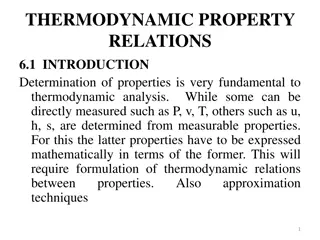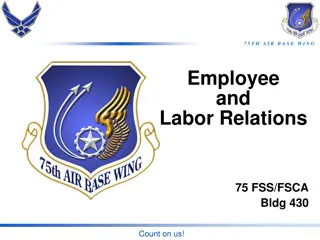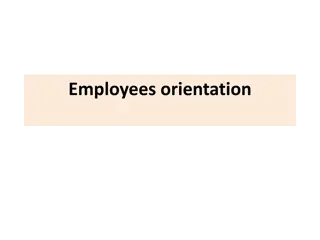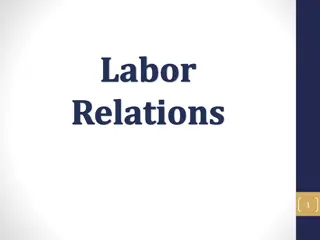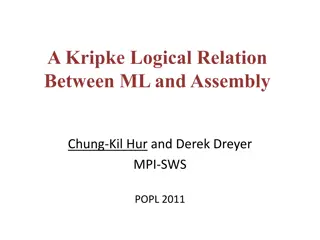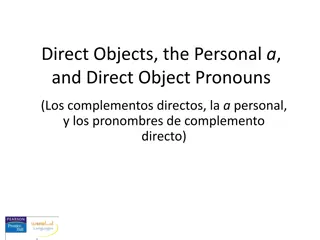Impact of Direct Employee Participation on Industrial Relations at Company Level
This project explores the development of direct employee participation and its impact on industrial relations at the company level. Desk research findings, social partners' views, and national dimensions regarding direct participation are summarized. The study highlights the current status of direct participation in Bulgarian enterprises, challenges faced by employers and trade unions, and the absence of a legal framework. Recommendations and conclusions are drawn based on case studies and data analysis.
Download Presentation

Please find below an Image/Link to download the presentation.
The content on the website is provided AS IS for your information and personal use only. It may not be sold, licensed, or shared on other websites without obtaining consent from the author.If you encounter any issues during the download, it is possible that the publisher has removed the file from their server.
You are allowed to download the files provided on this website for personal or commercial use, subject to the condition that they are used lawfully. All files are the property of their respective owners.
The content on the website is provided AS IS for your information and personal use only. It may not be sold, licensed, or shared on other websites without obtaining consent from the author.
E N D
Presentation Transcript
The Development of Direct Employee Participation and its Impact on Industrial Relations at Company Level (DIRECT) (VS/2016/0305) Project DIRECT Final Summary Steering committee meeting 17-18 April 2018, Dublin
Content Desk research - summary and preliminary conclusions The social partners views concerning the direct participation - national and sector dimensions (summary and preliminary conclusions) Case-studies summary of main findings and conclusions General conclusions and recommendations 1. 2. 3. 4.
1 Desk research (summary and preliminary conclusions)
DESK RESEARCH Main summaries and conclusions from publications, data from surveys and legal documents: There used to be some forms of direct participation and legal provision in 1986-1990 in the Bulgaria enterprises; Currently the direct participation is implemented in some of the companies in Bulgaria (mainly in the MNCs and other big companies) but it is still in the beginning; The main forms are rather consultative (meetings with managers, study of workers views); Some of employers still have doubts concerning the use of direct participation; Some trade union representatives also underestimate the direct participation; There is no legal framework of the direct participation, with the exception of provisions of the Labour code, concerning General Assembly of all the employees in the enterprises: Since 1990 the topic of direct participation in management is rarely found in scientific literature and research, including the cases of managerial research approaches and research on industrial and labor relations.
2 The social partners views concerning DP - national and sector dimensions (summary and preliminary conclusions)
THE SOCIAL PARTNERS VIEWS CONCERNING DP - NATIONAL AND SECTOR DIMENSIONS The resources of study include the views of: Nationally representative social partners (CITUB and BIA) Representatives of the sectoral social partners (sectoral federations of CITUB and sectoral employers associations, members of BIA and other national employers organisations): o From the food processing and transport sector employers organisations and trade unions; o From metallurgy, machine-building, recycling - only the employers representatives; o From trade, retail, cooperatives, services, tourism - only trade union representatives
THE SOCIAL PARTNERS VIEWS CONCERNING DP - NATIONAL AND SECTOR DIMENSIONS Most of the respondents do not have sufficient, precise and acceptable information concerning the practical participation; The opinions rely on the personal experience and information acquired from the company members and have not been well investigated and documented; In many cases the views of employers and trade union representatives concerning direct participation seem to be very similar; The practical forms of direct participation according the social partners are rather addressed to the improvement of the production process, work organization and productivity, sometimes to health and safety at work, than to more conflicting issues as wages, social benefits, etc.; The views of employers and trade union representatives are different mainly with regard to the negative impact of DP and the meaning of effective direct participation and framework of DP; Both sides believe that the trust between the partners and the existence of social dialogue are prerequisites implementation of direct concerning the need of legal for direct participation and for
3 Case-studies summary of main findings and conclusions Companies: Carlsberg subsidiary-Bulgaria, Coca-Cola HBC-subsidiary - Bulgaria; Airport of Sofia
CASE-STUDIES SUMMARY OF MAIN FINDINGS AND CONCLUSIONS In all the cases the forms of individual participation and of team work and group participation are used and various forms are implemented; In Carlsberg and in the Airport of Sofia participation and delegation of functions are used (but the consultations are more broad and important and in Coca-Cola - only consultations are implemented; In all the companies the power distribution concerning the composition of the working teams and the selected issues for discussion is either shared between the workers and supervisors or in some cases fully dependent on the workers; however, the final decisions concerning the implementation of the workers suggestions (in cases of consultations) belongs to the supervisors and the top managers; both consultative
CASE-STUDIES SUMMARY OF MAIN FINDINGS AND CONCLUSIONS The focus of all the three cases is rather on the production issues; some labour issues, which are important for the workers but are closely related to the production and logistics are also often discussed; There is a visible impact on the management and organisation, in particular recognition and improvement of the qualification levels and wage formation in Carlsberg units in Bulgaria and in the Airport of Sofia; In all three cases trade unions and other workers representatives are informed and in some cases consulted about the forms of DP; in Carlsberg and Airport of Sofia trade unions also participate in the negotiations, concerning the forms of DP; With regard to the evaluation of the impact of DP, it is clear that the managers evaluate the results higher, than the trade union representatives.
CASE-STUDIES SUMMARY OF MAIN FINDINGS AND CONCLUSIONS There is no principal difference in the model of DP, based on the form of property (private or (manufacturing or services); The direct participation is better used in the companies, where particular work organisation (lean production) is implemented; The impact of DP concerns the improvement of practical skills of the workers, recognition of non-formal and formal qualification, also the increase of the productivity; this leads to some increase of the wages, mainly with implementation of bonus systems for payment; There are also reserves for improvement of the results increasing motivation for work in all the three companies, which depends on the management approach and to some extend on the trade union and other workers representatives concerning the policies of direct participation; public) and on the sector views and suggestions
CASE-STUDIES SUMMARY OF MAIN FINDINGS AND CONCLUSIONS The direct participation is more broad in the companies, where better industrial relations exist; However, the link between the forms of direct participation and the forms of workers representation representatives, H&S committees ) are still not visible enough ; The trade union involvement in the implementation (or in worse case in the monitoring) of the direct participation practices could be still improved. (trade unions, I&C
4 GENERAL CONCLUSIONS AND RECOMMENDATIONS
GENERAL CONCLUSIONS AND RECOMMENDATIONS There is already a progress in the implementation of DP in the companies in Bulgaria, but the consultative participation is still dominating; Despite some specific interpretations of DP, expressed both by the sides of employers and trade unions, all of them evaluate it as an important tool and they remark its positive impact; Except the lack of legal framework concerning DP, the written provisions either in the collective agreements or in the company rules could be rarely observed; Most of the respondents of the survey remark, that the main conditions for implementation of DP are the good working climate, organisational culture, trust between the employers/managers and trade unions/other workers representatives, good will by all sides and good social dialogue; Some data from the case-studies shows that there is a link between the quality of industrial relations and the scope and results from direct participation; on the other way, there is no evidence that the direct participation leads to the neglecting of trade union influence;
GENERAL CONCLUSIONS AND RECOMMENDATIONS There is still not enough good integration between the forms of direct participation and the other forms of workers representation and participation at company level (I&C, EWC members, general assemblies, H&S committees, trade union mechanisms like collective bargaining, etc.); Trade unions are still not enough involved in the policies and monitoring of the direct participation; The impact of the direct participation on the company management and quality of working life in general is rather positive
GENERAL CONCLUSIONS AND RECOMMENDATIONS The social partners should be more active concerning the issues of DP: for example some provisions could be put into the collective agreements or in company rules (negotiated with the trade unions); The employers and managers should give more and clear information about DP and increase the dissemination of the results; The managers and trade unions at company level should make more efforts to improve the links between the forms of DP and other forms of workers representation, as well as the governing bodies of the companies; Trade unions could better use the information and results from DP in the process of preparation of collective bargaining process and prevention of collective labour disputes; Social partners at national and sector level could organize forums for exchange of information experience and dissemination of results of good practices of DP, using the experience of their partners form other European countries and collected information by the European and international organizations, to which they are affiliated; The practices of DP requires both a further theoretical rationale and empirical and analytical research, as well as reasoned discussions between the social partners, the state administration and the academic community; the main focus should be the possible changes under the process of digitalization.







